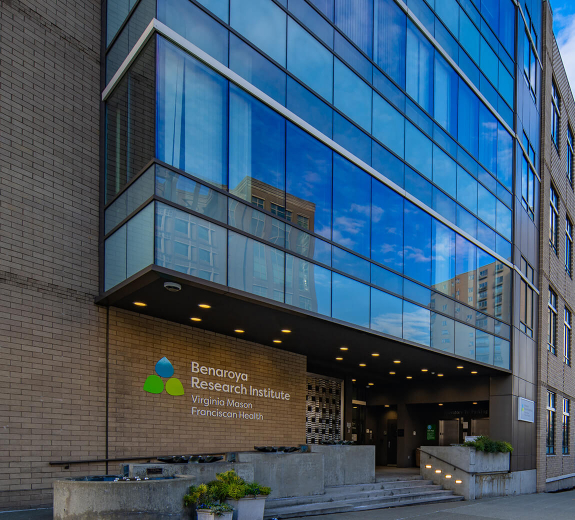Scientists at the Benaroya Research Institute at Virginia Mason (BRI) have received a $3.3 million, National Institutes of Health grant for research that could help explain why immune cells malfunction and cause type 1 diabetes, multiple sclerosis, rheumatoid arthritis and many other autoimmune diseases. “This could help us understand why some people develop autoimmune diseases, and why the diseases are more severe and develop faster in some patients but not others,” says President Jane Buckner, MD.
Autoimmune diseases affect 23 million people in the U.S. and occur when T cells (a type of immune cell) mistakenly turn against the body. The new, 4-year grant will enable BRI researchers to investigate a key mystery: Do excess amounts of a chemical called interleukin-6 (IL-6) – or an exaggerated response to it – cause T cells to mistake the body’s cells as enemies and attack them?
IL-6 helps regulate T cells and tell them how to function. Earlier research showed that T cells have an exaggerated response to IL-6 in people with type 1 diabetes and multiple sclerosis, whereas in rheumatoid arthritis there are excess levels of IL-6.
“Our hypothesis is that this excess IL-6 or an exaggerated response to it makes T cells malfunction and drives many different autoimmune diseases,” says Buckner, who leads the new project.
Buckner’s team will try to pinpoint why some T-cells have more IL-6 receptors than others. The researchers will also examine how excess IL-6 changes how T cells function in healthy people and in people with type 1 diabetes, multiple sclerosis and rheumatoid arthritis.
To accomplish this, the research team will study T cells in blood samples donated to BRI’s biorepositories. These biorepositories house blood samples from thousands of people who volunteer to participate in BRI’s research.
Buckner and her colleagues will also use a cutting-edge technology, called single-cell analysis to isolate individual T cells and study the effects of IL-6.
The research could also inform a new generation of drugs that target IL-6 receptors and suppress IL-6 in people with rheumatoid arthritis, juvenile idiopathic arthritis and type 1 diabetes. Buckner’s team will investigate how increased numbers of IL-6 receptors influence how patients respond to these drugs.
“These drugs are a promising step toward disarming autoimmune disease,” Buckner says. “Our work could lead to ways to make them more effective for more patients.”
The research is part of BRI’s larger push to identify the mechanisms that autoimmune diseases have in common. Because autoimmune diseases all share a common cause—mistakes made by the body’s immune system—scientists can use breakthroughs made against one autoimmune disease to make progress against them all.
“Understanding how dysregulated IL-6 contributes to autoimmune diseases could bring us closer preventing or stopping them, and to potentially helping millions of people lead longer, healthier lives,” Buckner says.



